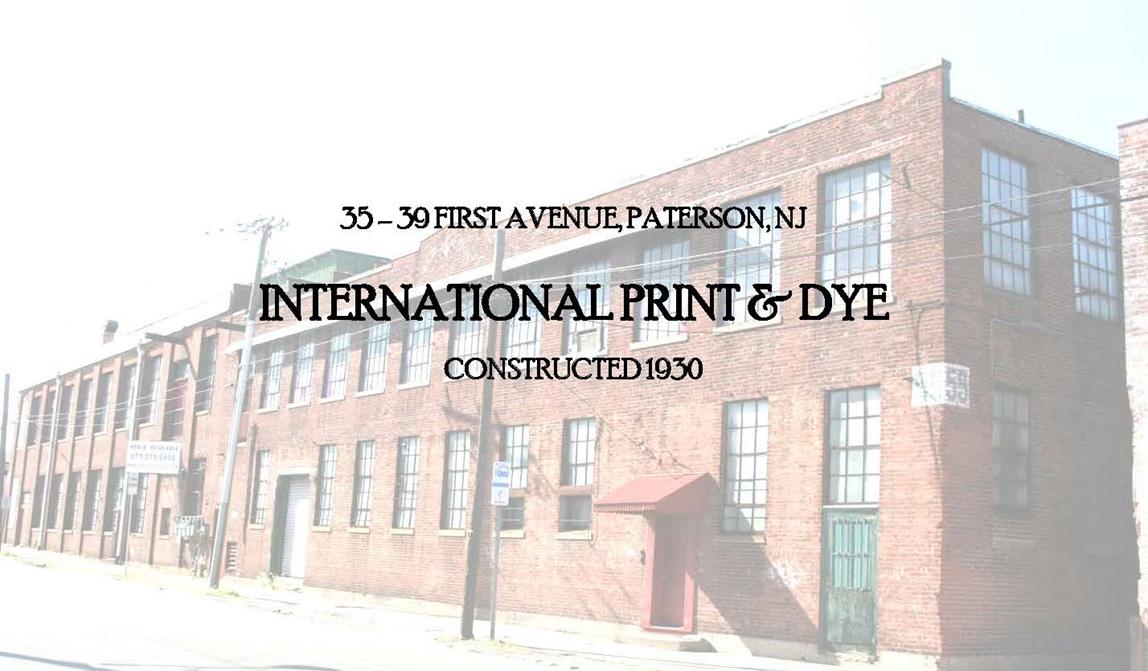
Architectural Description
The West Dye House at International Print & Dye is a ca.
1930, 2-story, 10-bay brick industrial building. It has a side-gabled roof with
a frame monitor roof. At the roofline is a short, aluminum siding-clad parapet
wall. The bays are divided by projecting brick pilasters. Windows have 36
lights and metal frames. The rectangular window openings have stone sills. The
window openings on both elevations at the southwest corner of the building have
been infilled with concrete block. At the first story of the west elevation are
two garage bays with rolling metal doors, one of which has a small metal
loading dock. Attached to west elevation are several contiguous, 1-story, frame
storage sheds with shed roofs. The south elevation has a modified bay with
brick infilled and a flush metal door. A secondary entry has been cut into one
of the first story window openings of a central bay. Also on the south
elevation is a hoisting mechanism, below which are second-story double-wide
doors.
The East Dye House at International Print & Dye is a 2-story, 12-bay brick industrial building with a flat roof. At the center of the roofline on the south façade is a subtle stepped parapet wall. The roofline is capped with aluminum. Above 10 of the 12 second story bays is an aluminum awning. The second-story westernmost bay on the south elevation has doublewide doors, above which is a hoisting mechanism. Second-story windows have 25 lights in metal frames, with the middle 6 panes on a pivot hinge. First story windows have 15 lights in metal frames. The rectangular window openings have stone sills. The first story front (south) elevation has a garage bay with a rolling metal gate and an entry with a flush door, above which is a metal awning.
History
The International Print & Dye Company was a late comer
in the silk dyeing industry with its predecessors establishing roots in Paterson
during the late 19th century. Sanborn insurance maps from 1931 are the first
known instance of the name "International Print & Dye" being used
within the Paterson silk industry. The company is not mentioned in Albert H.
Heusser's "The History of the Silk Dyeing Industry in the United
States." This 1927 tome comprehensively covers silk dyers established at
the time of publication, leading to the assumption that International Print & Dye had yet to exist. Just four years later, however, International Print
& Dye had constructed a compact complex along the Passaic River. Like other
silk dyeing works, this complex consisted of various, successive, relatively
small-scale departmentalized buildings. By 1950, Sanborn maps indicate that
"International Dye & Print Works" had become a division of Allied
Textile Printers, Inc.
References
Hyde, E. B. Atlas of Passaic County, New Jersey, 1877.
Robinson, E. Atlas of the City of Paterson, New Jersey, 1884.
Robinson, E. Atlas of the City of Paterson and Haledon, New Jersey, 1899.
Mueller, A. H. Atlas of the City of Paterson, New Jersey, 1915.
Sanborn Map Company Insurance, Maps of Paterson, New Jersey, 1915.
Sanborn Map Company Insurance, Maps of Paterson, New Jersey, 1931.
Sanborn Map Company Insurance, Maps of Paterson, New Jersey, 1950.